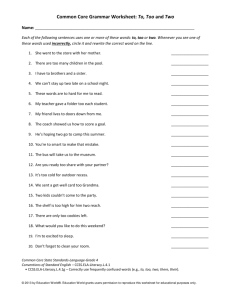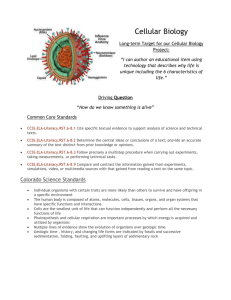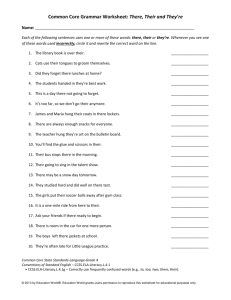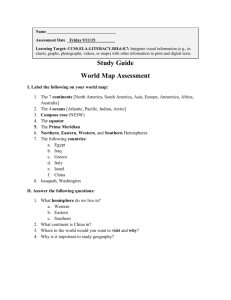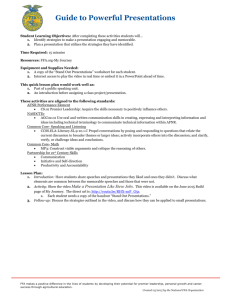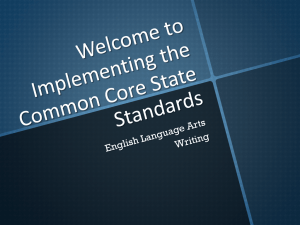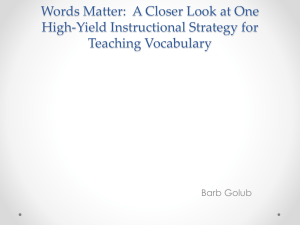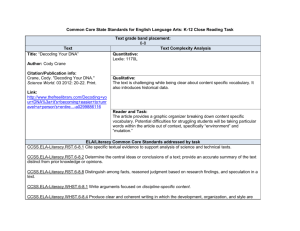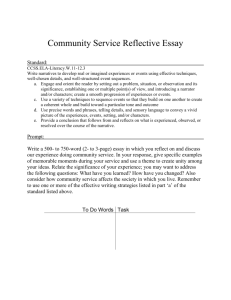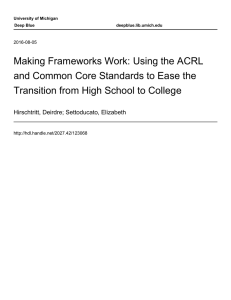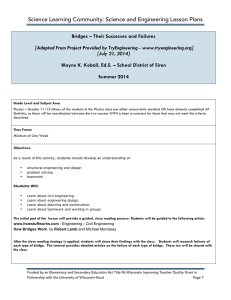Unit-9-Energy-Resources-May11th-May29th
advertisement
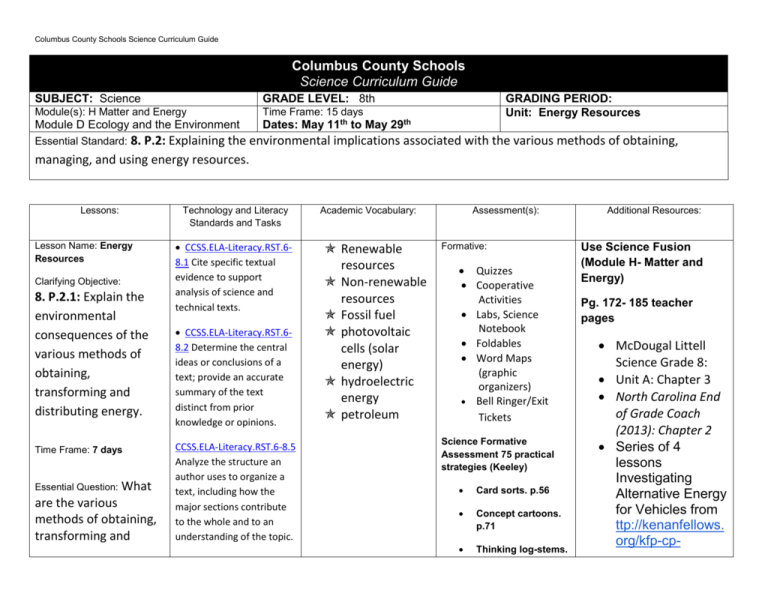
Columbus County Schools Science Curriculum Guide Columbus County Schools Science Curriculum Guide SUBJECT: Science GRADE LEVEL: 8th Module(s): H Matter and Energy Time Frame: 15 days Module D Ecology and the Environment Dates: May 11th to May 29th GRADING PERIOD: Unit: Energy Resources 8. P.2: Explaining the environmental implications associated with the various methods of obtaining, managing, and using energy resources. Essential Standard: Lessons: Technology and Literacy Standards and Tasks Lesson Name: Energy Resources Clarifying Objective: 8. P.2.1: Explain the environmental consequences of the various methods of obtaining, transforming and distributing energy. Time Frame: 7 days Essential Question: What are the various methods of obtaining, transforming and CCSS.ELA-Literacy.RST.68.1 Cite specific textual evidence to support analysis of science and technical texts. CCSS.ELA-Literacy.RST.68.2 Determine the central ideas or conclusions of a text; provide an accurate summary of the text distinct from prior knowledge or opinions. CCSS.ELA-Literacy.RST.6-8.5 Analyze the structure an author uses to organize a text, including how the major sections contribute to the whole and to an understanding of the topic. Academic Vocabulary: Renewable resources Non-renewable resources Fossil fuel photovoltaic cells (solar energy) hydroelectric energy petroleum Assessment(s): Formative: Quizzes Cooperative Activities Labs, Science Notebook Foldables Word Maps (graphic organizers) Bell Ringer/Exit Tickets Science Formative Assessment 75 practical strategies (Keeley) Card sorts. p.56 Concept cartoons. p.71 Thinking log-stems. Additional Resources: Use Science Fusion (Module H- Matter and Energy) Pg. 172- 185 teacher pages McDougal Littell Science Grade 8: Unit A: Chapter 3 North Carolina End of Grade Coach (2013): Chapter 2 Series of 4 lessons Investigating Alternative Energy for Vehicles from ttp://kenanfellows. org/kfp-cp- Columbus County Schools Science Curriculum Guide distributing energy? (solar, wind, hydro, biomass, geothermal, fossil fuels, nuclear) How does the use of energy resources affect the environment? STUDENT “I CAN” STATEMENTS I can identify the many forms of energy that we use in our daily lives. I can compare and contrast the different kinds of energy sources and the effects on the environment. I can identify ways to use energy from the sun. CCSS.ELA-Literacy.RST.6-8.6 Analyze the author’s purpose in providing an explanation, describing a procedure, or discussing an experiment in a text. p.191 Uncovering student ideas in science. Vol. 4 (Keeley) Activity: Write to Learn Global warming p.143 Where does oil come from? P.151 8. P.2.2: Explain the implications of the Clarifying Objective: Summative: Science 6 11.1 What are Earth's natural resources? Lesson Name: Energy Conservation and renewal. Justified true or false p.126 Activity: Write to Learn Science 6 11.2 Where do we get energy? Science 6 11.3 How implications depletion renewable nonrenewable conservation preservation Projects (with rubrics: Powerpoint/Flipcha rt, Animoto, Prezi, brochures, WebQuests, internet based research assignments sites/cp06/cp06/in dex.html Project Learning Tree: Activity 14, 15, 19, 37, 39, 89 Project Wild: “Cartoons and Bumper Stickers” p. 192 “What You Wear is What They Were” p.210 “Arctic Survival” p. 234 Chapter and Unit tests(Science fusion Test bank) Formative: Quizzes Cooperative Activities Labs, Science Notebook Foldables Use Science Fusion (Module D- Ecology and the Environment) Unit 3 Lesson 5- Managing Resources Pg. 238- 250 teacher Columbus County Schools Science Curriculum Guide depletion of renewable are fossil fuels formed and used? and nonrenewable energy resources and the importance of conservation. natural resources stewardship Word Maps (graphic organizers) Bell Ringer/Exit Tickets Summative: Time Frame: 8 days Essential Questions: Why should natural resources be managed? STUDENT “I CAN” STATEMENTS I can discuss the implications of the depletion of renewable and nonrenewable resources. I can list ways to conserve energy. I can give examples of the environmental impacts of using fossil fuels in the future. Chapter 3: Pages 72-85 Projects (with rubrics: Powerpoint/Flipcha rt, Animoto, Prezi, brochures, WebQuests, internet based research assignments ClassScape: Classroom based and County Benchmark Chapter and Unit tests(Science fusion Test bank) pages McDougal Littell Science Grade 8: Unit A: Chapter 3 North Carolina End of Grade Coach (2013): Chapter 2 Series of 4 lessons Investigating Alternative Energy for Vehicles from ttp://kenanfellows.org /kfp-cpsites/cp06/cp06/index .html Project Learning Tree: Activity 14, 15, 19, 37, 39, 89 Project Wild: “Cartoons and Bumper Stickers” p. 192 “What You Wear is What They Were” p.210 “Arctic Survival” p. 234
